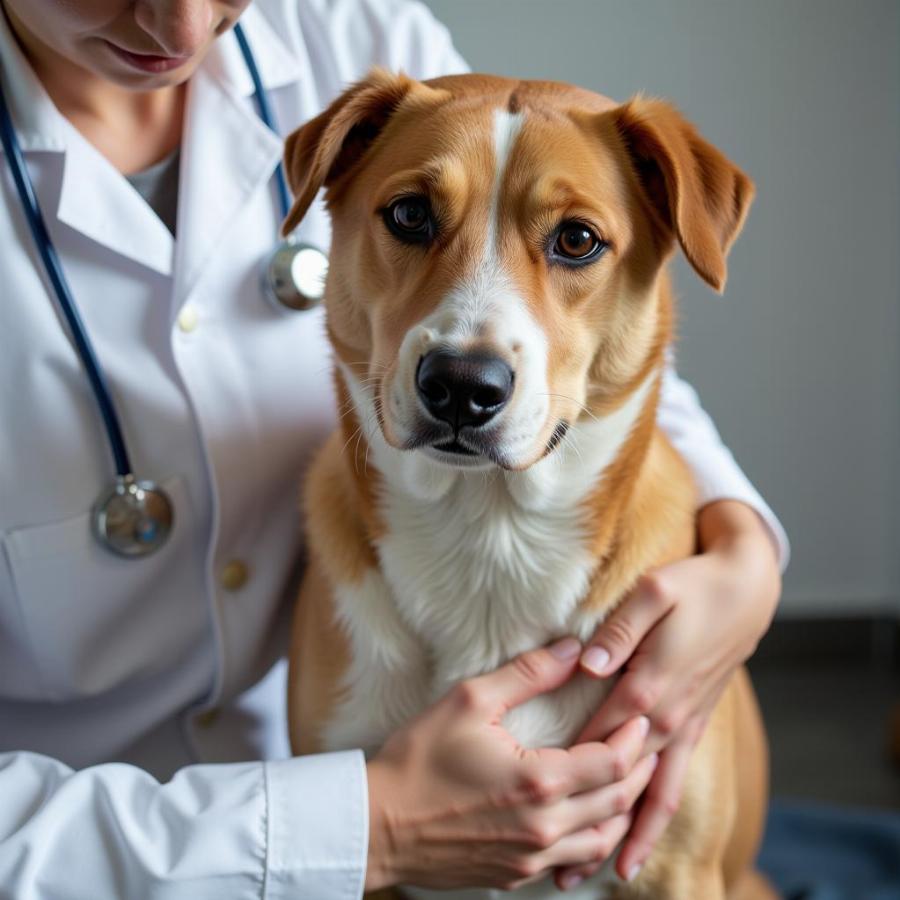Is your furry friend’s tummy making a symphony of sounds, yet their food bowl remains untouched? Dog stomach gurgling not eating is a common concern for pet parents, and it’s important to understand the reasons behind this behavior. While some causes can be benign and temporary, others might signal a more serious underlying health issue. This article delves into the possible explanations for your dog’s gurgling stomach and lack of appetite, helping you determine when it’s time to seek veterinary attention.
Understanding Dog Stomach Gurgling (Borborygmi)
Just like humans, dogs experience stomach noises, known as borborygmi. These rumbling, growling, or gurgling sounds result from the movement of gas and fluids through the digestive tract. It’s a normal part of digestion, often occurring after meals or during periods of fasting.
However, when these sounds become excessive, unusually loud, or are accompanied by other symptoms like loss of appetite, it’s essential to pay attention.
Possible Reasons Why Your Dog’s Stomach is Gurgling and They’re Not Eating
There are several reasons why your dog’s stomach might be making noise while they refuse to eat. Some are simple and easily addressed, while others require prompt veterinary care.
1. Benign Causes:
- Hunger Pangs: An empty stomach can lead to increased contractions as the digestive system tries to move any remaining food or fluids. This often results in noticeable gurgling sounds.
- Gas: Just like us, dogs can experience gas build-up in their digestive tract. This can be due to various factors, including swallowing air while eating, dietary changes, or food sensitivities.
- Recent Dietary Change: Switching your dog’s food abruptly can disrupt their gut flora and lead to digestive upset, including gurgling sounds and a temporary decrease in appetite.
2. Potential Health Concerns:
- Gastrointestinal Upset: One of the most common culprits is a simple tummy upset. This could be caused by eating something spoiled, overeating, or a mild case of food poisoning.
- Inflammatory Bowel Disease (IBD): IBD is a chronic condition that causes inflammation in the digestive tract, leading to symptoms like stomach gurgling, vomiting, diarrhea, and weight loss.
- Parasites: Intestinal parasites, such as roundworms, hookworms, and tapeworms, can irritate the gut lining, leading to digestive issues and decreased appetite.
- Pancreatitis: Inflammation of the pancreas can cause intense abdominal pain, vomiting, and loss of appetite.
- Obstruction: Ingesting foreign objects, like toys, bones, or fabric, can create a blockage in the digestive tract, leading to severe complications.
When to Worry and Seek Veterinary Care
It’s crucial to monitor your dog closely if their stomach gurgling is accompanied by a loss of appetite.
Contact your veterinarian immediately if you notice any of the following:
- Lethargy and Weakness
- Vomiting or Diarrhea (especially with blood)
- Abdominal Pain or Distension
- Fever
- Dehydration
- Loss of Appetite for More Than 24 Hours
These symptoms could indicate a serious underlying condition requiring immediate medical attention.
Diagnosing the Cause of Stomach Gurgling and Loss of Appetite
To determine the cause of your dog’s discomfort, your veterinarian will conduct a thorough physical examination and ask about their medical history. They may also recommend diagnostic tests, such as:
- Fecal Examination: To check for parasites.
- Blood Tests: To assess organ function and look for signs of infection or inflammation.
- X-rays or Ultrasound: To visualize the digestive tract and rule out obstructions or other abnormalities.
Treatment Options
The treatment for your dog’s stomach gurgling and loss of appetite will depend on the underlying cause. It may include:
- Medications: Such as anti-nausea medications, antibiotics, anti-inflammatory drugs, or dewormers.
- Dietary Changes: Switching to a bland diet or a special therapeutic diet formulated for digestive issues.
- Fluid Therapy: To address dehydration.
- Surgery: In cases of intestinal obstruction.
 Veterinarian examining a dog with gurgling stomach
Veterinarian examining a dog with gurgling stomach
Preventing Stomach Gurgling and Appetite Loss in Dogs
While not all causes are preventable, you can take steps to promote good digestive health in your furry friend:
- Feed a High-Quality Diet: Choose a nutritionally balanced diet appropriate for your dog’s age, breed, and activity level.
- Introduce New Foods Gradually: When switching your dog’s food, do it gradually over several days to minimize digestive upset.
- Avoid Feeding Table Scraps: Many human foods can be harmful to dogs and lead to digestive problems.
- Provide Fresh Water: Ensure your dog always has access to clean, fresh water.
- Schedule Regular Veterinary Checkups: Regular checkups allow your veterinarian to detect and address potential health concerns early on.
Why is my dog’s stomach gurgling and he won’t eat?
A gurgling stomach and loss of appetite in dogs can be due to various reasons, ranging from simple hunger pangs or gas to more serious conditions like gastrointestinal upset, parasites, or pancreatitis.
What does it mean if my dog’s stomach is making noises and he’s not eating?
If your dog’s stomach is noisy and they’re not eating, it’s essential to monitor them closely for other symptoms. It could indicate a simple issue like an upset stomach or something more serious requiring veterinary attention.
Should I be worried if my dog’s stomach is gurgling loudly?
While occasional stomach gurgling is normal, loud and persistent noises accompanied by other symptoms like vomiting, diarrhea, lethargy, or loss of appetite warrant a visit to the veterinarian.
For All Your Dog Care Needs, Trust Beaut Dogs
Beaut Dogs is your one-stop resource for all things dog-related. We are dedicated to providing you with reliable and insightful information to help you understand and care for your canine companion better.
For any further assistance or specific concerns about your dog’s health, please don’t hesitate to contact us at [email protected]. Our team of experts is here to provide you with the guidance and support you need.